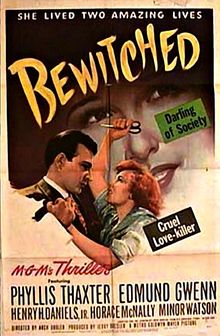
BEWITCHED
US, 1945, 65 minutes, Black and white.
Phyllis Thaxter, Edmund Gwenn, Addison Richards, Kathleen Lockhart, Stephen McNally?.
Directed by Arch Oboler.
Bewitched is a short-running film, made by MGM with its production values, just as the war was ending. It links its theme of multiple personalities to the experience of the war.
The film was written, produced and directed by Arch Oboler, from his short story `Alter Ego'. It is a precursor of the '50s films of The Three Faces of Eve, Lizzie etc., with their women and multiple personalities.
While the film introduces the theme and seems to present it in a fairly basic way, it is nevertheless quite intriguing. Edmund Gwenn is a sympathetic doctor who does not believe in multiple personalities but uses hypnosis to discover the truth. Stephen McNally? (then Horace McNally) is the sympathetic hero, lawyer. Phyllis Thaxter, at the beginning of a short career, has the sweetness and gentleness to make audiences believe that she could not have multiple personalities. However, she makes the role credible with the interior voices talking to her so often and compelling her, even to kill, to want to die so as to destroy the other personalities.
The scepticism of the time is presented in the attitudes of the governor of the state. These were comparative early times in dramatising psychological themes in film. However, with this in mind, it is an interesting attempt for the style of film which was later to develop and to be successful in such works as Sybil.
1.Melodrama? Psychology? Multiple personalities and their consequences? Sanity and insanity? Violence? The law?
2.Brief running time, MGM production values, the strength of the cast? The special effects - especially for Joan's hypnosis? Musical score?
3.The title, its perspective on multiple personalities and sanity?
4.The flashback technique: Dr Bergson and his reminiscences, his comments on the situation, going back to Joan? The collage of her going to the electric chair? This perspective in exploring her character?
5.Phyllis Thaxter and her gentleness and sweetness as Joan? The credibility of multiple personalities? At her engagement, the torment of the other voices, her love for Bob? Her parents? The breakdown at the engagement, her letter? Going to New York, getting the job, the friendly co-worker, the comedy with the owner? The encounter with Eric? Falling in love, in New York, the captain and the boat? The passion and her other characters emerging? Karen and her malice, wanting Bob, wanting Eric? Joan running away from Eric? Bob finding her, Karen emerging and urging her to kill? Bob's death?
6.The arrest, the court case, her not saying a word in her defence? Eric and his defending her? Her parents, their puzzle and hurt?
7.The jury and their verdict, Eric's encouragement, Dr Bergson? Her calling out that she was guilty? Joan wanting to kill Karen by being executed? Her wanting to die?
8.Dr Bergson, his personality, experience? His believing Joan responsible? The multiple personality? The desire for hypnosis, the plea to the governor, trying to persuade him? The governor and his scepticism? The hypnosis, Joan saying she wanted to die? The failure of the hypnosis? The sudden emergency of Karen and the changed effect?
9.Therapy, hypnosis - being cured of this kind of multiple personality in one short hypnosis scene? However, the dramatising and its hope? The death of Karen? The consolidation of Joan?
10.The popularity of this kind of psychological study? This film in the mid-'40s? The influence on similar films of the '50s and later decades?